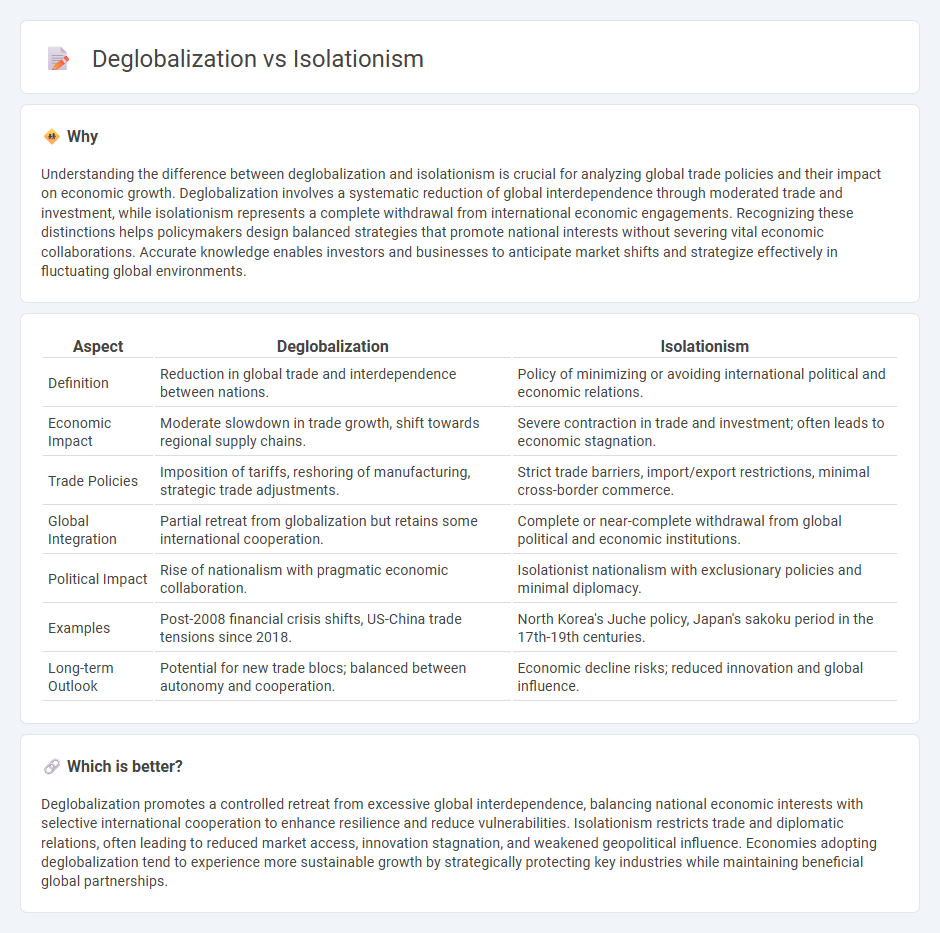
Deglobalization involves the gradual reduction of interdependence and integration between nations, focusing on reshaping global supply chains and trade policies to enhance domestic economic resilience. Isolationism, by contrast, advocates for minimal international engagement, often prioritizing self-sufficiency and strict border controls to protect local industries. Explore deeper insights into how these economic strategies impact global markets and national growth.
Why it is important
Understanding the difference between deglobalization and isolationism is crucial for analyzing global trade policies and their impact on economic growth. Deglobalization involves a systematic reduction of global interdependence through moderated trade and investment, while isolationism represents a complete withdrawal from international economic engagements. Recognizing these distinctions helps policymakers design balanced strategies that promote national interests without severing vital economic collaborations. Accurate knowledge enables investors and businesses to anticipate market shifts and strategize effectively in fluctuating global environments.
Comparison Table
| Aspect | Deglobalization | Isolationism |
|---|---|---|
| Definition | Reduction in global trade and interdependence between nations. | Policy of minimizing or avoiding international political and economic relations. |
| Economic Impact | Moderate slowdown in trade growth, shift towards regional supply chains. | Severe contraction in trade and investment; often leads to economic stagnation. |
| Trade Policies | Imposition of tariffs, reshoring of manufacturing, strategic trade adjustments. | Strict trade barriers, import/export restrictions, minimal cross-border commerce. |
| Global Integration | Partial retreat from globalization but retains some international cooperation. | Complete or near-complete withdrawal from global political and economic institutions. |
| Political Impact | Rise of nationalism with pragmatic economic collaboration. | Isolationist nationalism with exclusionary policies and minimal diplomacy. |
| Examples | Post-2008 financial crisis shifts, US-China trade tensions since 2018. | North Korea's Juche policy, Japan's sakoku period in the 17th-19th centuries. |
| Long-term Outlook | Potential for new trade blocs; balanced between autonomy and cooperation. | Economic decline risks; reduced innovation and global influence. |
Which is better?
Deglobalization promotes a controlled retreat from excessive global interdependence, balancing national economic interests with selective international cooperation to enhance resilience and reduce vulnerabilities. Isolationism restricts trade and diplomatic relations, often leading to reduced market access, innovation stagnation, and weakened geopolitical influence. Economies adopting deglobalization tend to experience more sustainable growth by strategically protecting key industries while maintaining beneficial global partnerships.
Connection
Deglobalization and isolationism both emphasize reducing dependence on global trade and international cooperation to protect domestic industries and national sovereignty. Deglobalization involves scaling back cross-border economic integration, while isolationism seeks to minimize political and economic entanglements with other countries. Together, these trends reshape global economic patterns by prioritizing self-sufficiency and limiting foreign influence in domestic markets.
Key Terms
Trade Barriers
Isolationism promotes strict trade barriers to protect domestic industries by limiting international economic engagement, often resulting in higher tariffs and import restrictions. Deglobalization, while also characterized by increased trade barriers, stems from a broader retreat from global economic integration, driven by shifts in geopolitical dynamics and supply chain realignments. Explore the distinctions between isolationism and deglobalization to understand their impact on global trade policies and economic strategies.
Supply Chains
Isolationism prioritizes national self-sufficiency by reducing reliance on foreign supply chains to protect domestic industries and secure critical resources. Deglobalization involves restructuring global supply chains to enhance regional production hubs, aiming to mitigate risks from geopolitical tensions and disruptions while maintaining interconnected trade networks. Explore the evolving strategies reshaping supply chains in a shifting global economic landscape.
Autarky
Isolationism emphasizes national withdrawal from international political and economic engagements to preserve sovereignty, while deglobalization seeks to reduce global interdependence primarily driven by economic and environmental motives. Autarky represents a form of economic self-sufficiency central to both concepts, aiming to minimize reliance on foreign trade and resources by promoting domestic production and consumption. Explore the dynamics and impacts of autarkic policies to better understand their role in isolationism and deglobalization.
Source and External Links
Isolationism - Wikipedia - Isolationism is a political philosophy advocating a foreign policy that opposes involvement in the political affairs, especially the wars, of other countries, favoring neutrality and avoiding military alliances and mutual defense pacts.
Milestones: 1937-1945 - American Isolationism in the 1930s - During the 1930s, American isolationists advocated non-involvement in European and Asian conflicts and sought to avoid entanglement in international politics, influenced by the Great Depression and memories of World War I losses.
Isolationism | Definition & Facts | Britannica - Isolationism is a national policy of avoiding political or economic entanglements with other countries, and it has been a recurring theme in U.S. history, notably expressed in the Farewell Address of George Washington and the early 19th-century Monroe Doctrine.
 dowidth.com
dowidth.com